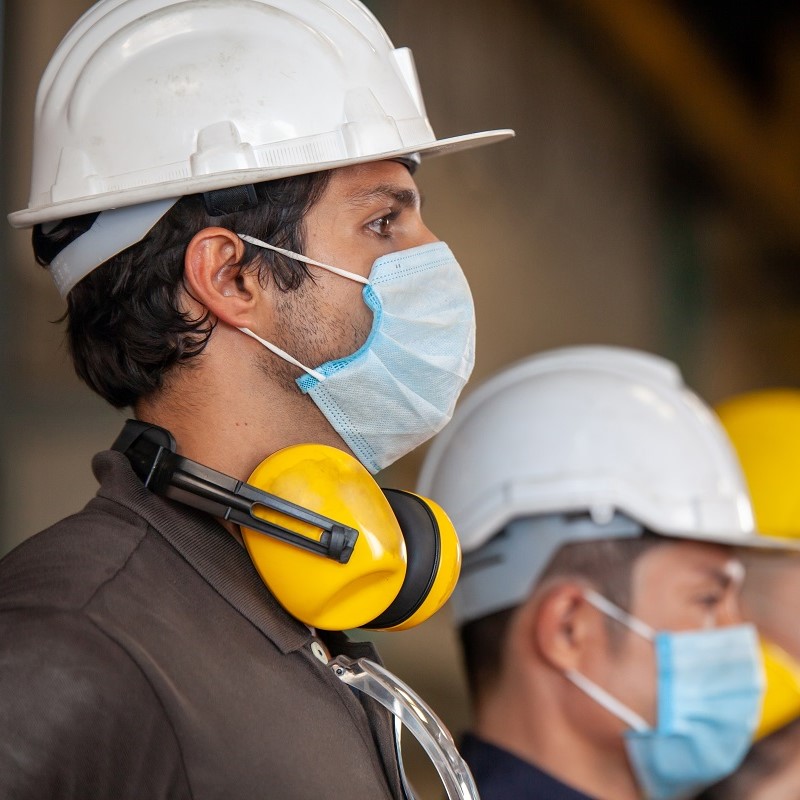06.05.2020
Resumption of regular operations - employer's obligations for occupational health and safety

In many companies and industries, work is gradually being ramped up again after weeks of downtime. The top priority here is to continue to provide adequate protection for workers in order to prevent a renewed increase in the number of infections. To this end, employers must take special protective measures for their employees, customers and business partners. On 16 April 2020, the Federal Ministry of Labour and Social Affairs (BMAS) published the SARS-CoV Occupational Safety and Health Standard (SARS-CoV-2-
Arbeitsschutzstandard), which formulates concrete requirements for the occupational safety and health measures to be taken and implemented by the employer. What do employers need to bear in mind in this respect?
The employer has numerous secondary obligations towards the employee - including protection obligations - arising from the employment relationship. He is in particular obliged to take appropriate measures to protect life and health.
The Act on the Implementation of Measures of Occupational Safety and Health to Encourage Improvements in the Safety and Health Protection of Workers at Work (Arbeitsschutzgesetz, ArbSchG) central public law framework regulation for occupational health and safety, in which the employer's fundamental (technical) occupational safety and health obligations are regulated.
The protection obligations include measures to ensure and improve the safety and health of employees at work. In order to plan and implement the measures, the employer must ensure that a suitable organisation is in place and provide the necessary resources. He also has to take the necessary precautions in order to ensure that the measures are observed and that the employees fulfil their obligations to cooperate. In
addition, the employer must determine the risks associated with the work of the employees and which occupational health and safety measures are necessary (so-called risk assessment). Risk assessment essentially involves identifying the hazards at specific workplaces, evaluating the risks, determining the measures required to eliminate the source of the hazard and determining the nature of the controls. The provisions of the German Occupational Safety and Health Act are specified in more detail by means of statutory decrees.
For employers, it should be noted that the works council has a right of co-determination in matters of occupational health and safety pursuant to Section 87 (1) no. 7 of the German Works Constitution Act (Betriebsverfassungsgesetz, BetrVG). The right of co-determination refers to occupational health and safety measures which the employer must take on the basis of a statutory framework regulation (e.g. provisions of the ArbSchG). This also applies in principle to occupational health and safety measures taken by the employer in connection with COVID-19. Accordingly, the prerequisite for a works council's right of
co-determination is that there is a statutory duty to act, but there are no mandatory requirements, so that a company regulation is necessary (Federal Labour Court (BAG) 30 September 2014, 1 ABR 106/12). In this context, the works council also has a right of initiative and can make its own proposals. If the employer and the works council cannot agree on the design of the protective measures, the conciliation committee must be called upon. If the works council is not properly involved, the employees are in principle not obliged to comply with the company's instructions - except in emergency situations. The works council must also be involved in the risk assessment which the employer is obliged to carry out. Employers must therefore keep the works council's co-determination rights in mind when planning the timing of the re-start of operations.
The SARS-CoV-2 Occupational Safety and Health Standard issued by the Federal Ministry of Labour is not a law or ordinance that setting out the provisions of the ArbSchG in more concrete terms. However, the employer must take the Occupational Safety and Health Standard into account as an orientation and interpretation aid following a corresponding risk assessment when implementing his already existing obligation under Section 3 ArbSchG. Employers must comply with the BMAS requirements in order not to expose themselves to liability risks. When implementing occupational health and safety measures, the employer is required to seek advice from occupational safety managers and company doctors. The coordination of additional protective measures can be carried out by an occupational health and safety committee set up for this purpose. Alternatively, consideration should be given to setting up a crisis task force under the direction of the employer or a person commissioned in accordance with Section 13 ArbSchG/DGUV Regulation 1 “Principles of Prevention”, with the involvement of the works council, the occupational safety manager and the works council (Source DGUV).
The Occupational Safety and Health Standard emphasises two principles:
- If the minimum distance of 1.5 m cannot be reliably maintained at the company, mouth-and-nose-covering must be provided by the employer and worn by the employees.
- As a general rule, persons with respiratory symptoms or fever should not be on plant premises at all. An exception may apply if the company is part of critical infrastructure according to the RKI recommendations or if the doctor has clarified the symptoms. To this end, the employer must
establish a procedure for dealing with suspected cases.
In addition, special technical, organisational and personal occupational safety measures are listed in the Standard. These include the following areas:
- arrangement of the workplace as well as hygiene measures regarding work equipment and tools;
- hygiene measures in washroom facilities, break rooms and canteens;
- regular ventilation of the premises;
- infection control measures for special areas, e.g. field service staff and delivery services;
- priority on working from home;
- avoidance of business trips and meetings;
- instructions on how to deal with suspected cases; as well as
- staggered working and break times.
Please refer to the following link for further details: https://www.bmas.de/SharedDocs/Downloads/DE/PDF-Schwerpunkte/sars-cov-2-arbeitsschutzstandard-en.pdf?__blob=publicationFile&v=2

Achim Braner
Partner
Frankfurt a.M.
achim.braner@luther-lawfirm.com
+49 69 27229 23839

Nadine Ceruti
Counsel
Frankfurt a.M.
nadine.ceruti@luther-lawfirm.com
+49 69 27229 24795